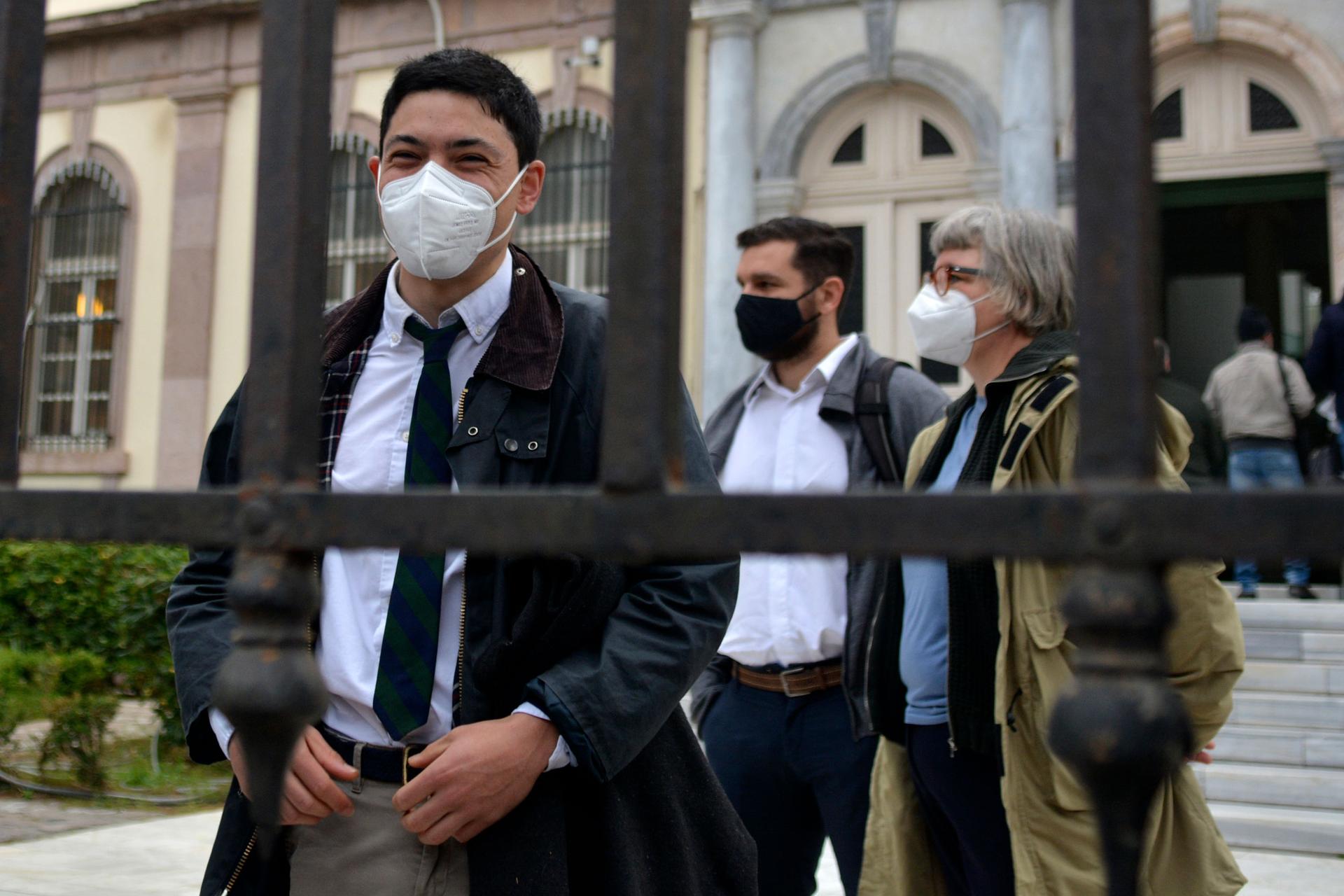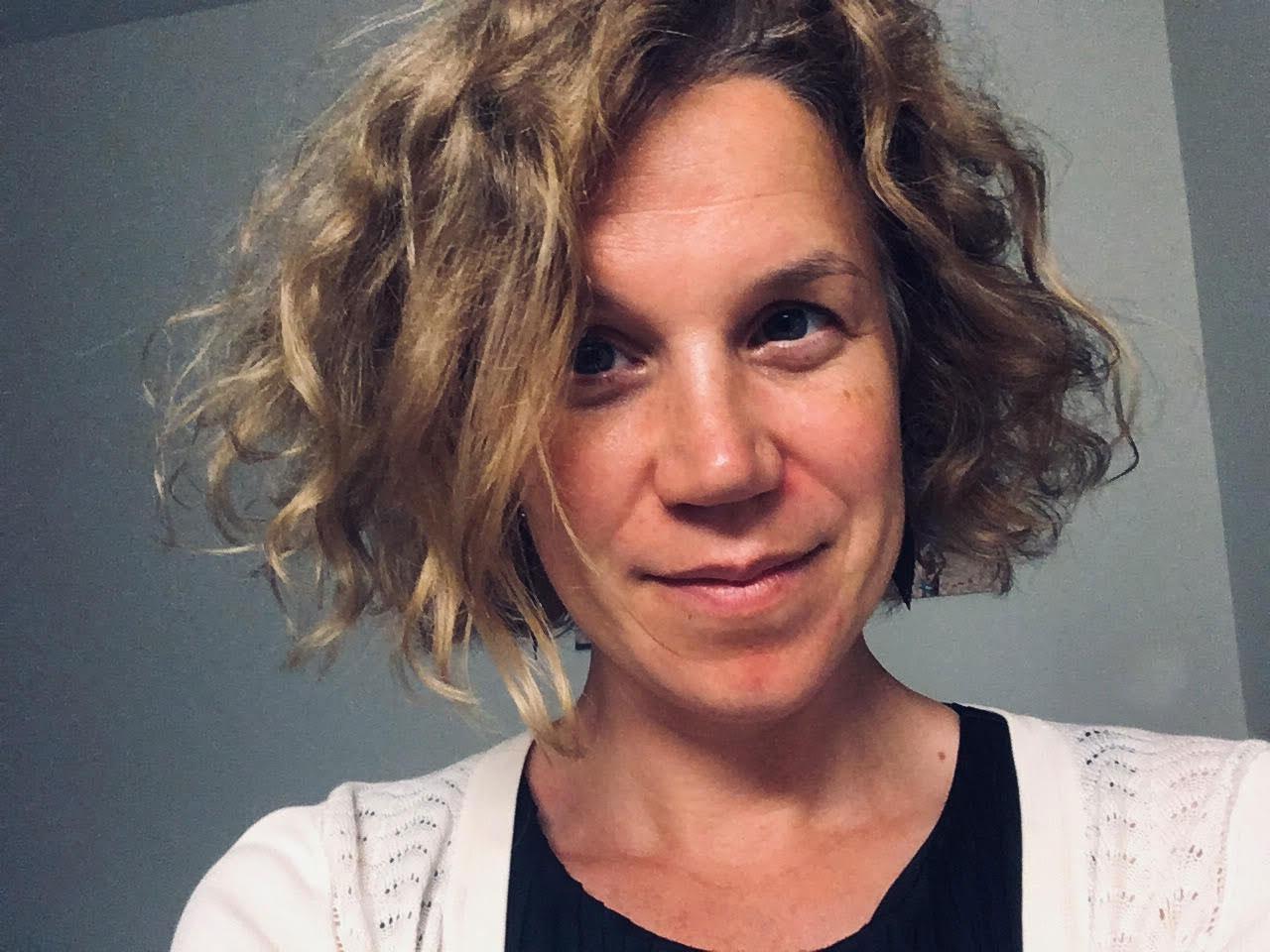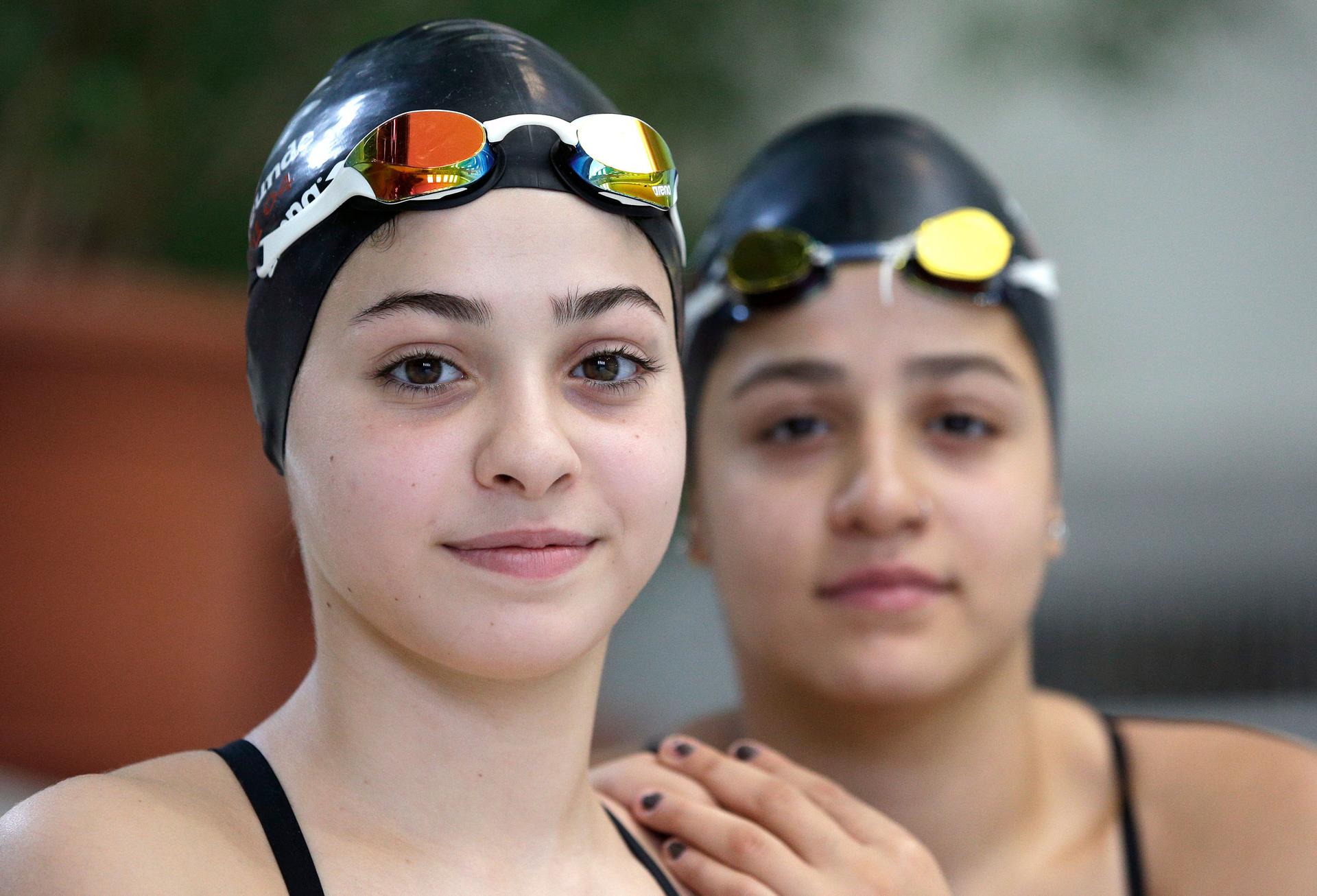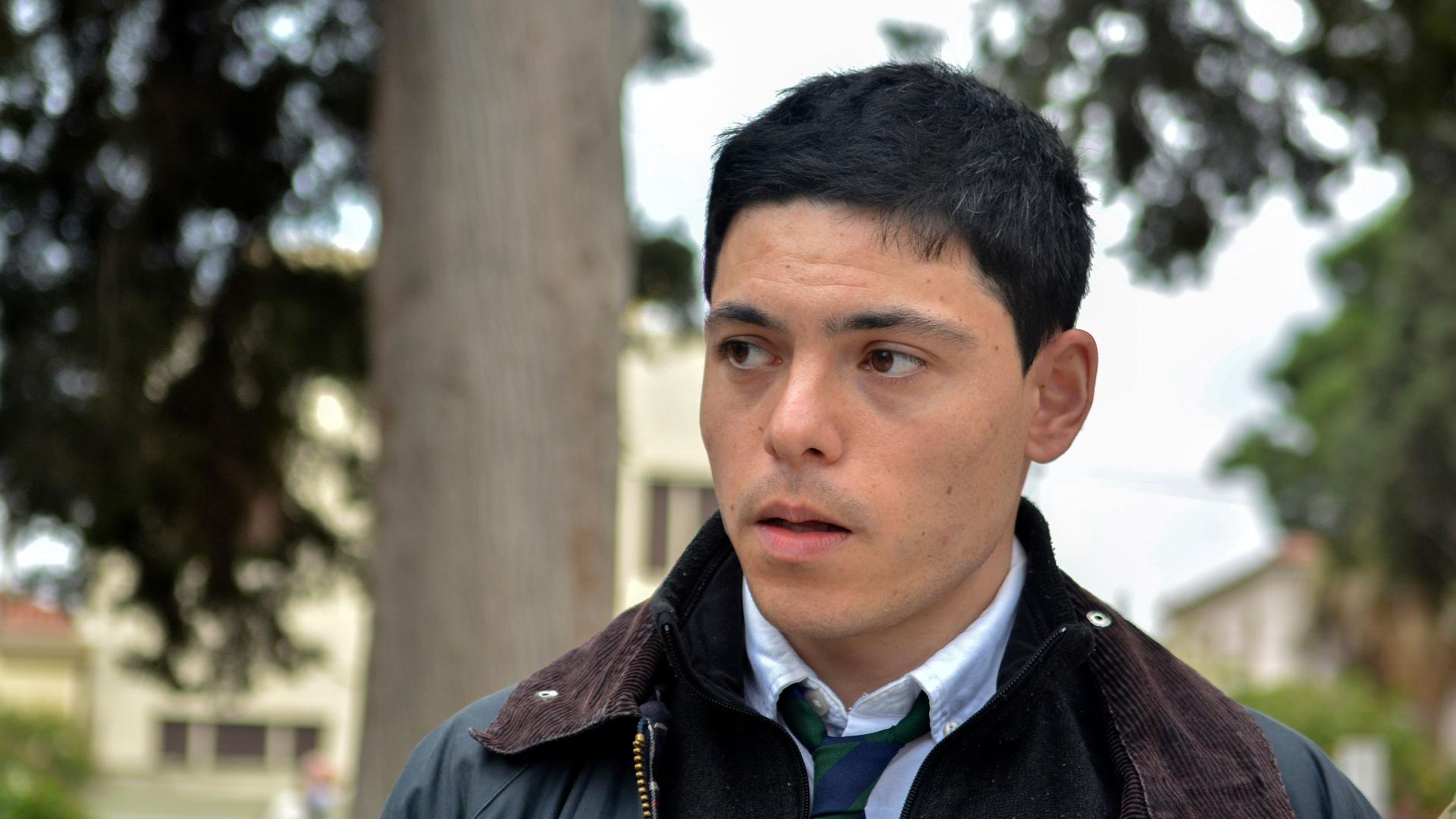Irishman Seán Binder moved to the Greek island of Lesbos in 2017 to volunteer with a local search-and-rescue nongovernmental organization that helps refugees and migrants arriving off the coast.
This week, Binder stood trial in Greece accused of espionage, forgery and supporting a criminal organization. He is one of 24 aid workers facing such charges. Binder said the offenses — which he denies — were intended to bring an end to nongovernmental organizations carrying out rescue missions of migrants at sea.
Related: In Greece, thousands of asylum-seekers are waiting for the COVID-19 vaccine
“There’s an effort to stop search-and-rescue from taking place, because there is a false narrative that search-and-rescue, even if it’s attempting to do something good, is actually causing more smuggling to happen.”
“There’s an effort to stop search-and-rescue from taking place because there is a false narrative that search-and-rescue, even if it’s attempting to do something good, is actually causing more smuggling to happen,” Binder said.
Binder, who was born in Germany but grew up in Ireland, said he was moved to volunteer after seeing images on TV of refugees from countries like Syria embarking on harrowing boat trips to reach Europe.

But one year after arriving on Lesbos, Binder along with his colleague, Sara Mardini, and several other volunteers with the now-defunct NGO Emergency Response Centre International (ERCI), were detained on a series of charges.
Rights groups like Amnesty International condemned the arrests, saying the charges were farcical. Human Rights Watch called the trial “politically motivated.”
The conservative government in Greece is seen as having adopted an increasingly hard-line approach toward migrants since coming into office in 2019. The Greek Coast Guard Command has been accused of engaging in illegal pushbacks of asylum-seekers arriving in their waters back to Turkey.
Greek Prime Minister Kyriakos Mitsotakis has vigorously rejected the claims. At a press conference in Athens recently, Mitsotakis became visibly irritated when questioned about it by a foreign journalist. The Coast Guard was out “rescuing people at sea every day,” he said.
“Yes, we are intercepting boats that come from Turkey as we have the right to do in accordance with European regulation and waiting for the Turkish Coast Guard to come and pick them up to return them to Turkey,” he said.
Related: A mental health crisis on Lesbos is worsening

Hanne Beirens, director of the Migration Policy Institute Europe, an independent research group, said trials like these can send out a message to other humanitarian workers who are considering volunteering on rescue missions.
“Even if the court case in itself results in acquitting the person, while the case is pending, you send out a warning signal to all other individuals or NGOs who are considering or may be tempted to support refugees and migrants in their neighborhood,” she said.
Beirens pointed out that EU member states do have laws in place that can penalize anyone who facilitates the irregular entry of migrants.
But Greece, along with nine other European countries, has included exemptions to those laws when the assistance takes place for humanitarian reasons.
Beirens said the political landscape has clearly shifted over the last few years. Southern European countries like Spain, Italy, Malta and Greece have adopted a less tolerant attitude toward NGOs and it’s having a detrimental effect, she said.
“And the result is if you look at the number of NGOs that are working in the Mediterranean basin, that number has gone drastically down,” Beirens said.
Related: Activists protest migrant facility plan in Greece: ‘Greek islands will not be turned to prisons’
Binder and Sara Mardini are the most well-known of the activists on trial in Greece.
Sara Mardini, a Syrian refugee, made international headlines in 2015 when, along with her sister, Yusra Sardini, they dragged their sinking refugee boat to safety. The sisters, both professional swimmers, dived into the water with two other men and swam 3 1/2 hours from Turkey to Greece, pulling the dinghy behind them. All 20 onboard survived. The Mardinis ended up in Germany and were granted asylum there. Yusra Mardini went on to compete in the Rio Olympics in 2016. Sara Mardini won a scholarship to Bard College in Berlin.

But in 2018, Sara Mardini decided to postpone her studies and move to Lesbos and volunteer to help other refugees arriving by sea. Sara Mardini was not in Lesbos for the trial this week — she is barred from returning to Greece for seven years following her arrest in 2018.
Athens-based lawyer Zacharias Kesses who represents Binder and Sara Mardini said hundreds of volunteers have left the island of Lesbos since the aid workers’ arrests in 2018. Kesses believes that the activists and the NGO were specifically targeted because they were well-known in Greece.
“Mardini was a very, very high profile volunteer. I think that they targeted ERCI because it was one of the most active and most famous organizations on the island.”
“Mardini was a very, very high-profile volunteer. I think that they targeted ERCI because it was one of the most active and most famous organizations on the island,” the lawyer said.
The trial has attracted widespread international attention.
Irish lawmaker Grace O’Sullivan spoke in the EU parliament earlier this month about the case and appealed for the charges to be dropped.
“They stand accused of espionage because they use WhatsApp. They are accused of being members of a criminal organization, a humanitarian NGO, which worked with local authorities to distribute blankets and basic medical care. In short, they stand accused of showing humanity,” O’Sullivan said.
Over 70 EU lawmakers have since signed an open letter supporting O’Sullivan’s appeal.
When the trial opened on Thursday in Lesbos, journalists were refused entry. Greek officials said it was due to COVID-19 restrictions. A short time later, proceedings were stopped because of a reported lack of interpreters. Then, the judge ruled that the case should be heard in a higher court and adjourned proceedings.
Speaking outside the courthouse, Binder said he was frustrated with the outcome.
“This just means months of more limbo as we wait for justice. I may not have been found guilty today, but effectively, I’m still not free. The criminalization of humanitarianism continues.”
Kesses, the lawyer, said he was disappointed with the postponement. But even if the trial had continued, Kesses pointed out that Binder and Sara Mardini face additional charges, including migrant smuggling and money laundering.
No date has been set for that trial because it’s still in the investigative stage, Kesses said. In spite of his frustration, Binder said he will never regret his work with refugees and migrants on Lesbos.
“Regret trying to help people? No, of course not. No one should ever regret that.”
Our coverage reaches millions each week, but only a small fraction of listeners contribute to sustain our program. We still need 224 more people to donate $100 or $10/monthly to unlock our $67,000 match. Will you help us get there today?
